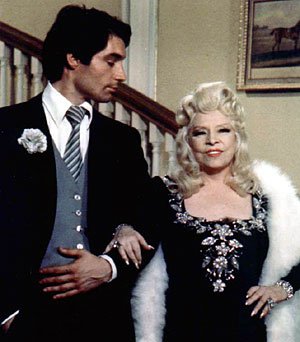
Written by Brigit McCone.
PUA (pick-up artistry) is a strange beast. Its core technique relies on teaching men to dehumanize women as “targets” in order to numb themselves to rejection, making it psychologically easier to approach larger numbers of women and therefore, statistically, to enjoy greater sexual success, though at the cost of emotional connection. PUA thus represents the art of maximizing sexual success by minimizing sexual satisfaction. Mae West’s 1978 film Sextette is also a strange beast, and a fascinating film. When I say that it’s fascinating, I don’t mean to suggest that it’s good. Sextette is a car crash of a film, a head-on collision between a lavish MGM musical and Tommy Wiseau’s The Room. It is a perfect candidate for interactive midnight screenings and ironic appreciation, which should be mandatory at every festival of women’s film.
The usual responses of male reviewers label Mae West as “delusional” and “grotesque” for her iron conviction in her own seductive power at the age of 84 (minimum). West was Billy Wilder’s original inspiration for the aging, predatory narcissist Norma Desmond in Sunset Blvd., while reviewer Nathan Rabin says of Sextette, “stick in a coda revealing that the whole thing was a ridiculous fantasy by an impoverished washerwoman nearing death, and the whole film would take on an unmistakably bittersweet, melancholy dimension.” Yes, the guy who invented the “Manic Pixie Dream Girl” label, to criticize self-centered male sexism, suggests that female fantasies of lifelong desirability are only valid if they are affirmed to be impossible in real life. The irony. It burns.
Real life, however, differs from such critics’ expectations of “realism.” Far from ending her life as a sex-starved, “impoverished washerwoman,” Mae West actually had a flourishing relationship with the ruggedly handsome wrestler Paul Novak, almost 30 years her junior, who remained devoted to her for 26 years in one of show business’ greatest romances, nursing her at her death but discouraging her from including him in her will.
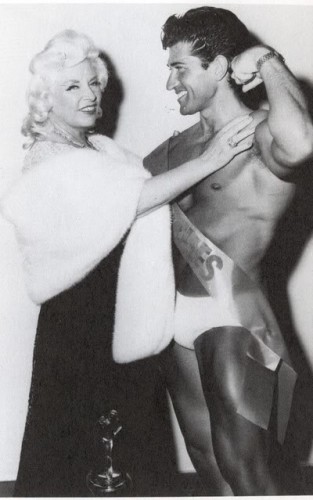
We may squirm at Sextette, to see an 84-year-old lady claim irresistible attractiveness without the apologetic, self-deprecating irony that we demand of older women’s sexuality, but Mae’s claims are securely grounded in her proven track record of seduction. If you will it, Dude, it is no dream. If Mae had listened to dominant culture’s messages about the female sell-by date, she would never have dared to play a sex-bomb in her late 30s, her age in her Hollywood debut, or selected a much-younger and undiscovered Cary Grant for her co-star. We owe Cary Grant’s career to Mae’s “denial,” while her selection of a young Timothy Dalton for the leading man of Sextette shows a similar eye for star potential, the film prophetically comparing him to 007.
I don’t necessarily recommend Mae West’s narcissistic seductress as a role model for all women, but I strongly recommend her as Laverne Cox’s definition of a “possibility model”; Mae is a reminder that we define our own roles and culture is created partly by our consent. Mae West’s Sextette is the most perfect illustration that the values of dominant culture depend on its male authorship, while female authorship (Mae insisted on writing or co-writing all her films, dictating to directors on set) can just as easily create images of octogenarian vixens commanding the lustful worship of entire “United States athletic teams” of half-naked musclemen, and brokering world peace through their irresistible sexual power (why haven’t you seen this film yet?). Sextette uncomfortably tears down the curtain and reveals the balding wizard behind the Great and Powerful Oz of cinema’s “realism,” just as Singing In The Rain exposed the artificiality of Lina Lamont’s glamour by swapping the sex of the voice behind the curtain. Here lies Sextette‘s true countercultural anarchy, and the reason it deserves midnight screening immortality. But the film also represents, as we shall show with our trusty pualingo.com, a classic PUA manual.
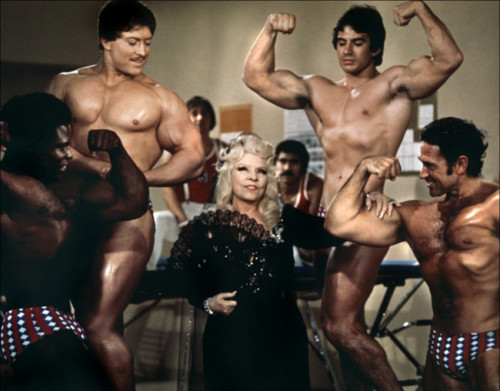
Abundance mentality is defined by PUA lingo as “the belief and life perspective that there is no shortage of hot girls to meet in any man’s lifetime.” This principle is continually reinforced within male-authored culture, from the female disposability fantasy of James Bond to the geriatric desirability dreams of Woody Allen, which influential New York Times critic Vincent Canby might have considered “a poetic, terrifying reminder of how a virtually disembodied ego can survive total physical decay and loss of common sense” if he hadn’t already said that about Sextette. Conversely, our culture constantly depicts narratives of female anxiety over their “biological clocks” and their “last chance for love,” reinforcing a scarcity mentality whose psychological impact is dramatized with wincing accuracy by the desperation romcom of Bridget Jones’s Diary. Mae West, however, modeled an abundance mentality throughout her life, in defiant immunity to cultural pressures. Though acknowledging her life partner, ruggedly handsome Mr. Baltimore, Paul Novak, was a “good guy,” she quipped in her mid-80s “course there’s 40 guys dyin’ for his job!”
The filmmakers originally intended West’s character, Marlo, to weep over Timothy Dalton’s abandonment, while goth-rock legend Alice Cooper (with tangerine tan and poodle perm, naturally. Why haven’t you seen this film?) serenaded her with piano ballad “No Time For Tears,” but Mae insisted that her character would not cry and forced Cooper to perform the jazzy, uptempo “Next, Next” (“he blew his chance with you! Next, next! Lost you to someone new!”), maintaining her character’s positive vibing so that the film’s advocacy of abundance mentality would not be compromised. West and Dalton’s final reconciliation suggests that this was only a soft next on Marlo’s part, however. Male critics interpret such abundance mentality as delusion, in a woman who resembles a macabre apparition and the monster from beyond time, but West’s track record of sexual success suggests that such protests be understood as token resistance.
Midnight screening suggestion: bring a loud buzzer to hit before yelling “next!”
DHV: Demonstration of Higher Value
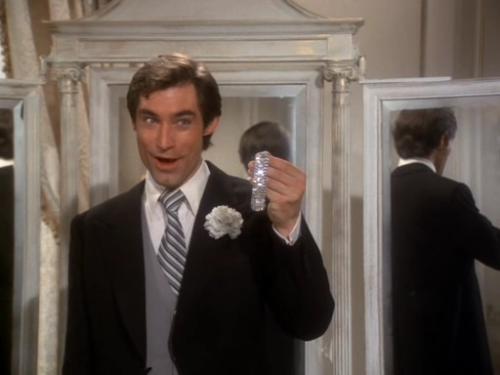
While male sexual value peaks between the ages of 21 and 30 (as clarified by Sextette‘s “happy birthday, 21!” anthem and Mae’s criticism of Tony Curtis as an unsuitably elderly screen lover, only 30 years her junior) and is largely dependent on the man’s rugged looks and muscle-tone, a woman may increase her sexual market value (SMV) at any age by a canned routine of humorous quips, positive vibing, displays of wealth and willingness to walk away or “soft next,” as Mae demonstrates throughout the film. The best technique for a DHV is to avoid direct bragging (which can actually read as desperation, and thus a demonstration of lower value, or DLV), through the use of wings to praise you on your behalf. In Sextette, the role of “Marlo’s wing” is played by Everyone Who Is Not Marlo. Before the central couple arrive, Regis Philbin brands Marlo “the greatest sex symbol the screen has ever known,” while an obliging crowd sings her DHV anthem “Marlo! The female answer to Apollo! As lovely as Venus De Milo! A living dream!” the press corps laugh at her every word and even ex-husband Ringo Starr shows willingness to wing for her: “You know when your wife was my wife? Your wife was some wife!” Such consistent DHV naturally provokes Timothy Dalton’s target into the production of expensive diamonds as well as verbal IOIs, in this clearly approval-seeking ballad (click. I dare you). Claims by male reviewers that this moment is like “gazing upon one of H. P. Lovecraft’s Old Ones, something so momentously and unimaginably monstrous that even perceiving the edges of it threatens one with madness” are best interpreted as manifestations of their bitch shields (BS).
Midnight screening suggestion: wing for Marlo by wolf-whistling and dangle bracelets of sparklers whenever she mentions being turned on.
NLP: Neuro Linguistic Programming
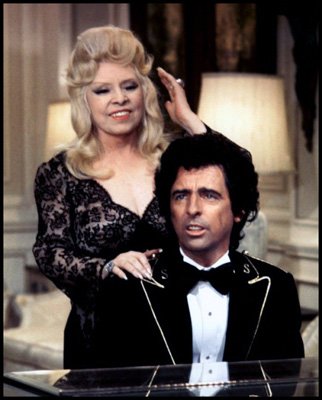
Neuro-linguistic programming is the art of conditioning the target‘s responses through ambiguity and anchoring. In an NLP context, ambiguity is the use of normal, innocuous words that sound like sexual terms, to unconsciously stimulate a man’s sexual senses. Mae West reveals herself a grandmistress of this art, with statements such as “I’m the girl who works at Paramount all day and Fox all night,” referencing her busy schedule as an actress, but subconsciously suggesting sexual stamina to the receptive male mind. “Everything goes up for Marlo!” literally refers to a pink cassette trampolined into a statue’s mouth (don’t ask) but on a deeply subtle and subconscious level could be regarded as sexually suggestive, while “when I’m good, I’m good, but when I’m bad, I’m better” might conceivably be associated with a sexual “bad girl” rather than with theft or arson. After this ingenious technique has made all men uncontrollably aroused by the octogenarian West, she is free to select her targets at will from their superabundance. Next!
Anchoring, meanwhile, is the art of associating gestures with emotional states through their repetition. In Sextette, Mae uses her anchors, such as trademark hair-patting, to elicit Pavlovian arousal by evoking her earlier performances, while groping her own breasts is a classic point to self (PTS) to anchor her feeling of success. A related art is kino, the regular touching and stroking of the target that prevents octogenarian actresses from ending up in his friend zone, which Marlo can be observed demonstrating on Ricky, the 21-year-old team mascot, throughout Sextette‘s gym scene. When male commentators describe the film as “like watching your grandmother at a gangbang,” the key is to reframe that observation, for example by cocking an eyebrow and purring “does that excite you?”
Midnight screening suggestion: Recognize NLP Ambiguity by clicking fingers and barking “you’re under!” in the style of Little Britain’s Kenny Craig, while all PTS maneuvers should be mimicked.
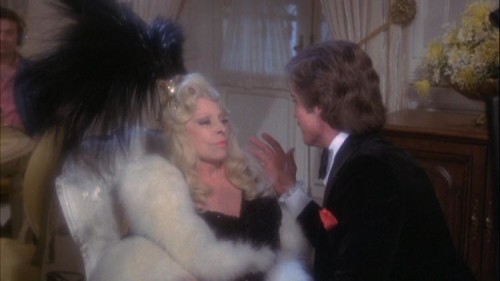
By wearing something showy, like a huge feather headdress or semi-transparent gown, a PUA is able to differentiate herself from her competition. Peacocking is a term derived from the biological behavior of peacocks and from Darwinism, not from the ginormous plumes crowning Mae West like a kooky cockatoo. Peacocking lures the PUA’s targets into starting conversations with her, offering her openings such as “what is that thing on your head? You look like a kooky cockatoo!” By wearing something completely ridiculous, the PUA also opens herself up to shit tests from men, such as New York Times critic Vincent Canby’s claim that Mae resembles “a plump sheep that’s been stood on its hind legs, dressed in a drag-queen’s idea of chic, bewigged and then smeared with pink plaster.” By demonstrating that she can deal with this social pressure, Mae shows her irresistibly alpha characteristics. It must be admitted that, in the striking costumes of legendary, eight-time Oscar-winner Edith Head, Mae looks like a damn chic sheep dressed as sexy lamb.
Midnight screening suggestion: the most ridiculous feather boas and fascinators you can get your hands on, for regular stroking throughout the screening.
So what’s the moral of this study? Should we be inspired by Mae’s conquests of the screen and of ruggedly handsome wrestler, crowned Mr. Baltimore, Paul Novak, to endorse the indomitable positivity of PUA philosophy (go West, young woman)? Or point to the reactions of squirming male viewers to finally prove that PUA is creepy, once and for all? Or does the truth lie somewhere in between, in cultivating a confident independence and immunity to cultural pressure, while still respecting the consent of others? Who knows? Only one moral is certain: never, ever play a drinking game in which you do a shot for every sex pun in this movie. Seriously. You could die. [youtube_sc url=” https://www.youtube.com/watch?v=nH_j-DNJwZA”]
The trailer alone would get you bombed
Brigit McCone over-identifies with Norma Desmond in Sunset Boulevard. She writes short films and radio dramas. Her hobbies include doodling and making bad puns out of the corner of her mouth.